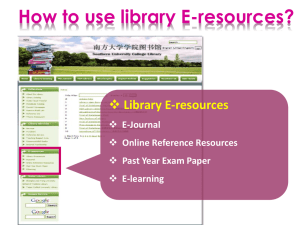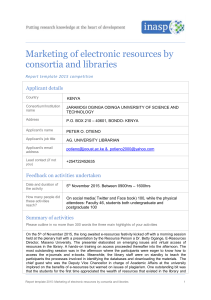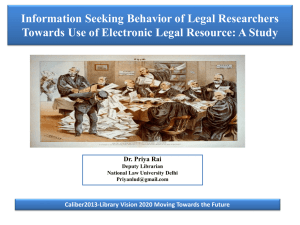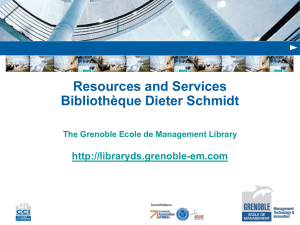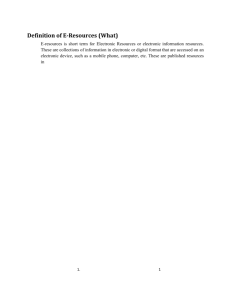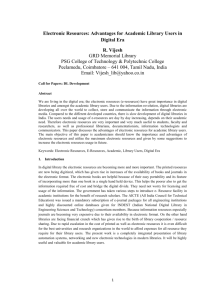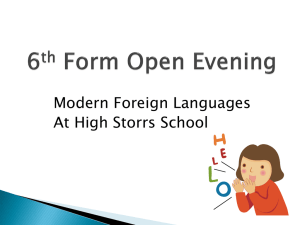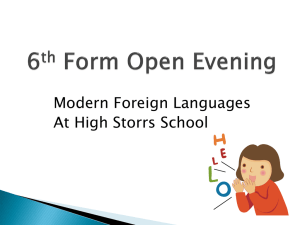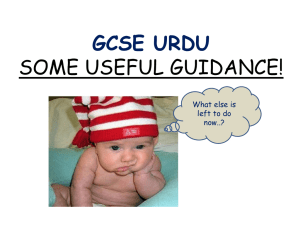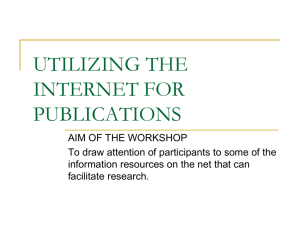Document
advertisement
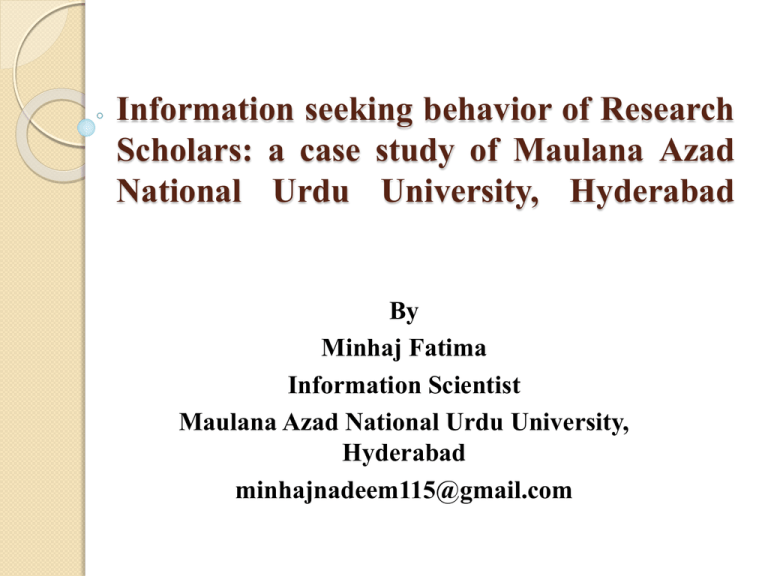
Information seeking behavior of Research Scholars: a case study of Maulana Azad National Urdu University, Hyderabad By Minhaj Fatima Information Scientist Maulana Azad National Urdu University, Hyderabad minhajnadeem115@gmail.com Introduction The library collection is slowly shifting from print to electronic form. The term “Information Seeking behavior” involves a set of actions like information needs, seek information, evaluate and select information and finally use this information to satisfy individual’s information needs. There are various factors that determine the information seeking behavior of an individual and it is necessary to understand the need and purpose for which information is required, various channels and sources preferred for acquiring information and barriers to information. Information is needed by everyone in every sphere of life. It is a vital source for overall development of the society. Libraries play a vital role in meeting the information needs of the individuals in the society. Libraries access, store and disseminate the information to satisfy the needs of the users. In order to accomplish this task effectively, libraries must have a thorough understanding of the information needs and information seeking behavior of their users. Need An attempt has been made in this study to find out the information needs and information seeking behavior of research scholars of MANUU in the digital era. Scope The scope of the study is limited to students and research scholars only. Objectives of the study To study the gender wise profile of users. To understand the purpose of using Web resources. To understand the preference for specific e-journals and online databases. To know the frequency of use of online databases. To know the satisfaction regarding the availability of online database. To know the quality of E-resources. To know the users opinion regarding the satisfaction of data collection from electronic resources. THE OBJECTIVES OF THE MAULANA AZAD NATIONAL URDU UNIVERSITY To promote Language. and develop Urdu To provide education through conventional teaching and the distance education system. Table 1: Gender and category S.No. Category Male Female Total 1. P.G. 15 03 18% Phil. 20 12 32% 18 46% 63 33 96 (100%) (65.6%) (34.4%) Students 2. M. Scholars 3. Ph. D. 28 Scholars TOTAL Table 2: Purpose of using Web resources S.No. Purpose Response Total 1. Access E-journals 05 5% 2. Access E-books 04 4% 3. Research work 02 2% 4. Browsing Internet 23 24% 5. For chatting 20 21% 6. Access Face book 19 20% 7. General Knowledge 03 3% 8. Access Emails 20 21% 96 100% TOTAL Table 3: Users most preferred ejournals and online databases S.No. Preferred Response Percentage online database 1. JSTOR 28 29.17% 2. Sage online 17 17.71% 3. Springer Link 25 26.04% 4. Cambridge 04 4.17% 22 22.91% 96 100% Online 5. TOTAL E-books Table 4: Frequency of use of online Databases S.No. Use of Online Databases Response Percentage 1. Everyday 10 10.4% 2. Weekly 32 33.4% 3. Fortnightly 16 16.6% 4. Monthly 22 23% 5. Rarely 16 16.6% 96 100% TOTAL Table 5: Satisfaction regarding the availability of Online databases S.No. Satisfaction of Online Response Percentage databases 1. Good 49 51.% 2. Average 33 34.4% 3. Poor 14 14.6% 96 100% TOTAL Table 6: Quality of E-resources S.No. Quality of E- Response Percentage resources 1. Good 46 48% 2. Average 43 44.7% 3. Poor 07 7.3% 96 100% TOTAL Table7: Is it easy or difficult to collect data from e-resources S.No. Satisfaction regarding data Response Percentage collection from E-resources 1. Easy 37 39% 2. Average 59 61% 3. Difficult 0 0% 96 100% TOTAL Conclusion The study revealed that E-resources were extensively used by male respondents as compared to the female. It was observed that majority of the respondents use the e-resources for browsing, chatting, accessing e-mails etc. Very few of them use it for their research work purpose. The frequency of use of these resources is monthly, fortnightly, and weekly. Very few users refer these resources every day. The study shows that ICT has transformed the information seeking behaviour of the users who have been using the traditional services to online environment. Online learning provides a new set of ICT tools that can add value to the traditional process of learning. The application of ICT has greatly enhanced the use of the electronic resources at Maulana Azad National Urdu University Library. Thank You
